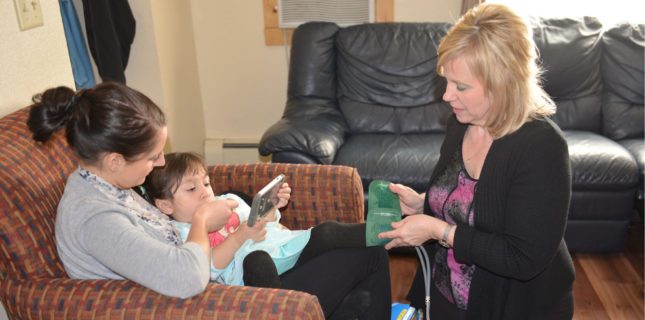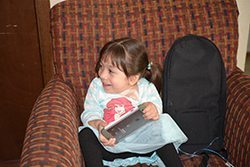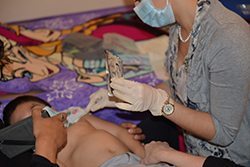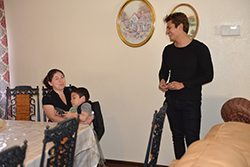Home Infusion Possible for Two Siblings Thanks to Interpreter Services

Every Tuesday, PHS infusion nurses Doreen and Ashley make a home visit to 4 year old Andrea and 8 year old Gerson for enzyme replacement therapy and are met with hugs from these siblings who have come to know their nurses as family.
Close behind Doreen and Ashley is Hector, an interpreter who joins them to facilitate conversation between Andrea’s and Gerson’s mom, Sonya, and the nurses. With this service, families are able to receive and completely understand the care being delivered while developing a relationship of trust with health care professionals.
A missing enzyme
When Gerson was three years old, Sonya brought him to their pediatrician with concerns about a bump on his back and how his chest was forming. After initially being told there was nothing to be worried about, a visit to a different clinic confirmed these features were indeed abnormal. Gerson was soon diagnosed with Morquio syndrome, and at five years old began receiving infusions weekly to replace the enzyme his body didn’t produce.
 Soon after Gerson began receiving treatment, doctors tested the whole family for the syndrome and his sister, Andrea, was diagnosed soon after. Thanks to this testing, Andrea was able to begin enzyme replacement therapy sooner and has seen improved physical development compared to her brother – a sign that she hopefully won’t need extensive surgery down the road.
Soon after Gerson began receiving treatment, doctors tested the whole family for the syndrome and his sister, Andrea, was diagnosed soon after. Thanks to this testing, Andrea was able to begin enzyme replacement therapy sooner and has seen improved physical development compared to her brother – a sign that she hopefully won’t need extensive surgery down the road.
“Gerson may need knee replacement surgery and hip surgeries, and also recently had testing done on his neck to see if he’ll need neck surgery,” Sonya said through Hector. “As he grows, the space in his neck is shifting.”
Therapy at home is everything
Bringing two young children to a clinic each week for a multiple hour infusion is a challenge to say the least – so when Andrea and Gerson’s doctor told Sonya that Pediatric Home Service provides this therapy at home, the decision to transition was an easy one.
 “Infusions at the clinic were always a little chaotic, as I managed them being hungry, sick, or bored,” said Sonya. “With Doreen and Ashley coming to the house, life can keep going – they have access to their beds, entertainment, food, and anything else they enjoy in their everyday life. It’s everything.”
“Infusions at the clinic were always a little chaotic, as I managed them being hungry, sick, or bored,” said Sonya. “With Doreen and Ashley coming to the house, life can keep going – they have access to their beds, entertainment, food, and anything else they enjoy in their everyday life. It’s everything.”
Because Sonya doesn’t drive, she also had to coordinate transportation each Tuesday prior to receiving care from PHS – another task she doesn’t need to worry about now.
Delivering clear communication
When a family’s primary language isn’t English, having an interpreter present (whether on the phone or in person) ensures caregivers have a clear understanding of the questions they’re being asked and the information they’re being given.
 Originally from El Salvador, Sonya and her family speak Spanish in the home – having Hector (pictured here with Sonya) at infusions each week means more peace of mind in what can be a stressful situation for children and family, thanks to his strong understanding of their diagnosis and infusion process.
Originally from El Salvador, Sonya and her family speak Spanish in the home – having Hector (pictured here with Sonya) at infusions each week means more peace of mind in what can be a stressful situation for children and family, thanks to his strong understanding of their diagnosis and infusion process.
“I don’t typically do in-home interpretation anymore, but have continued to come to Andrea’s and Gerson’s infusions because I’ve really developed a history with the family and their weekly routine,” said Hector. “It helps bring routine and ease for the kiddos, and I think we all really value the trust that has been built.”
Everyday moments
While enzyme replacement therapy will be a lifelong treatment, Sonya knows it doesn’t have to define her children – she chooses to focus on enjoying time outside with them, going to a lake, and being active despite such a complex medical diagnosis.
At 4 and 8 years old, Andrea and Gerson should be able to live life like any other child, and PHS knows that’s possible with services and therapy from nurses and interpreters.
Originally published: June 20, 2016

